高中英语情态动词的用法详解
- 格式:doc
- 大小:52.00 KB
- 文档页数:12

情态动词用法总结情态动词,又称情态助动词,是英语中一类特殊的助动词,包括can、could、may、might、must、shall、should、will、would等。
它们通常与动词原形搭配使用,用来表示说话人对动作或状态的态度、推测、许可、义务、建议等。
下面将分别从这几个方面进行总结情态动词的用法。
1. 表示能力和才能:can、could和able to都可以表示能力和才能,但用法稍有不同。
can和able to可以用来表示现在或将来的能力,而could则表示过去的能力或偶然的能力。
例如:- I can swim.(我会游泳)- She could speak three languages when she was 15.(她15岁时会说三种语言)- He was able to finish the task on time.(他能够按时完成任务)2. 表示推测和可能性:may、might和could可用来表示推测和可能性,其中may比might更常用,could表示可能性最低。
例如:- He may be at home.(他可能在家)- It might rain this afternoon.(今天下午可能会下雨)- She could be in the library.(她有可能在图书馆)3. 表示许可和禁止:can、could和may可用来表示许可,could表示客气一些。
而mustn't则表示禁止。
例如:- You can go now.(你可以走了)- Could I use your computer?(我能用一下你的电脑吗?)- You mustn't smoke here.(你不能在这里抽烟)4. 表示义务和必要性:must表示主观上的义务和必要性,常用来表示说话人的主观判断。
have to则表示客观上的必要性和强制性。
例如:- I must finish my homework tonight.(我必须今晚完成作业)- I have to get up early tomorrow.(我明天必须早起)5. 表示建议和推荐:should和ought to都表示建议或推荐,should更常用一些,ought to用得相对较少。

高中英语知识点归纳语法情态动词的运用高中英语知识点归纳:语法情态动词的运用高中英语中,语法知识点千变万化,其中一个重要的部分就是情态动词的运用。
掌握了情态动词的用法,可以帮助我们更准确地表达自己的意思,提升英语写作和口语表达能力。
本文将对高中英语中常见的情态动词进行归纳总结,并分别从推测、建议、允许、请求和义务五个方面进行讲解。
一、推测(speculation)1. must"must"表示推测时,常用于对现在情况进行推理,表示事物发生的可能性很大。
例如:He must be at home. (他肯定在家。
)2. might"might"是"may"的过去时态形式,表示推测时,表示事物发生的可能性较小。
例如:He might be at home. (他可能在家。
)3. could"could"表示推测时,表示事物发生的可能性较小。
例如:He could be at home. (他可能在家。
)4. can't"can't"表示推测时,表示肯定事物不可能发生。
例如:He can't be at home. (他不可能在家。
)二、建议(suggestions)1. should"should"常用于表示建议,用于表达应该或者应当发生的事情。
例如:You should go to bed early. (你应该早点睡觉。
)2. could"could"也可用于表示建议,表示某事情是可能发生的。
例如:You could try to study harder. (你可以努力学习。
)三、允许(permissions)1. can"can"表达某事物有权利、能力或许可做某事。
例如:You can go out to play. (你可以出去玩。


情态动词高中知识点高三情态动词是一类具有特殊意义和用法的动词,它们在句子中一般与实义动词连用,表示说话人的推测、命令、请求、建议等情态。
在高中英语学习中,掌握情态动词的正确用法至关重要。
本文将介绍情态动词的相关知识点,帮助高三学生更好地运用这一语法现象。
一、情态动词的定义情态动词,又称情态助动词,是用来表示说话人对某种动作或状态的态度、推测、可能性、能力、意愿、义务等情态的一类特殊动词。
常见的情态动词包括can、could、may、might、must、shall、should、will、would等。
二、情态动词的用法1. 表示能力情态动词can表示某人具有能力或可能做某事,could用于过去说法。
例如:- She can speak three languages fluently.(她能说流利的三种语言)- He could lift the heavy boxes when he was younger.(他年轻时能搬起这些沉重的箱子)2. 表示推测和可能性情态动词may、might、could用于表示推测和可能性。
may用于表示较为肯定的推测,might和could表示推测的可能性较小。
例如:- The weather is cloudy, it may rain later.(天气多云,可能会下雨)- He might be late for the meeting.(他可能会迟到会议)3. 表示义务和建议情态动词must表示说话人对某种行为具有强烈的责任感或坚决要求,should表示建议。
例如:- We must obey the laws of the country.(我们必须遵守国家的法律)- You should apologize to your friend for your mistake.(你应该为你的错误向朋友道歉)4. 表示许可和请求情态动词can、may、could用于表示允许和请求。
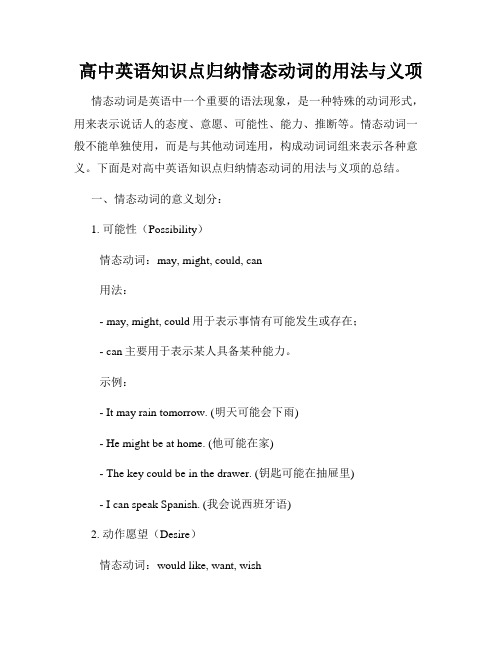
高中英语知识点归纳情态动词的用法与义项情态动词是英语中一个重要的语法现象,是一种特殊的动词形式,用来表示说话人的态度、意愿、可能性、能力、推断等。
情态动词一般不能单独使用,而是与其他动词连用,构成动词词组来表示各种意义。
下面是对高中英语知识点归纳情态动词的用法与义项的总结。
一、情态动词的意义划分:1. 可能性(Possibility)情态动词:may, might, could, can用法:- may, might, could用于表示事情有可能发生或存在;- can主要用于表示某人具备某种能力。
示例:- It may rain tomorrow. (明天可能会下雨)- He might be at home. (他可能在家)- The key could be in the drawer. (钥匙可能在抽屉里)- I can speak Spanish. (我会说西班牙语)2. 动作愿望(Desire)情态动词:would like, want, wish用法:- would like用于表示客气地提出请求或愿望;- want用于表示强烈的需求或欲望;- wish用于表示遗憾或对现在情况的不满或希望。
示例:- I would like to have a cup of coffee. (我想来一杯咖啡)- She wants to go shopping. (她想去购物)- I wish I had more free time. (我希望我有更多的空闲时间) 3. 推测与推断(Speculation)情态动词:must, may, might用法:- must用于表示说话人根据某种依据做出肯定的推测; - may, might用于表示可能性的推测。
示例:- It must be raining outside. (外面肯定在下雨)- He may/might be busy right now. (他可能正忙)4. 动作能力(Ability)情态动词:can, could用法:- can表示某人具备某种能力;- could表示过去的能力或给予请求、许可的非正式方式。
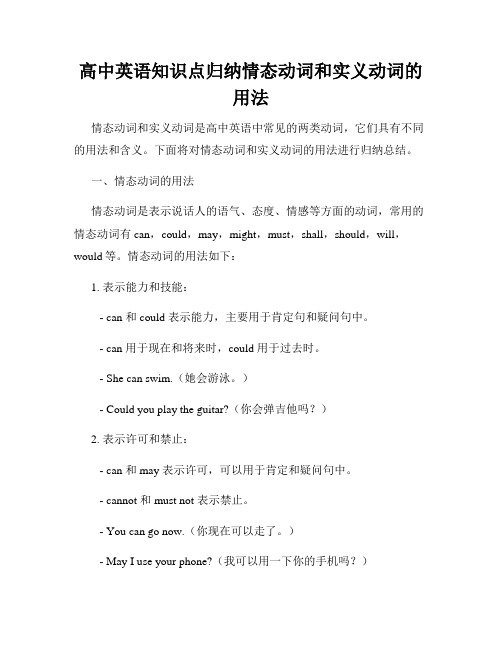
高中英语知识点归纳情态动词和实义动词的用法情态动词和实义动词是高中英语中常见的两类动词,它们具有不同的用法和含义。
下面将对情态动词和实义动词的用法进行归纳总结。
一、情态动词的用法情态动词是表示说话人的语气、态度、情感等方面的动词,常用的情态动词有can,could,may,might,must,shall,should,will,would等。
情态动词的用法如下:1. 表示能力和技能:- can 和 could 表示能力,主要用于肯定句和疑问句中。
- can 用于现在和将来时,could 用于过去时。
- She can swim.(她会游泳。
)- Could you play the guitar?(你会弹吉他吗?)2. 表示许可和禁止:- can 和 may 表示许可,可以用于肯定和疑问句中。
- cannot 和 must not 表示禁止。
- You can go now.(你现在可以走了。
)- May I use your phone?(我可以用一下你的手机吗?)- You must not smoke here.(你不能在这里抽烟。
)3. 表示推测和可能性:- may,might 和 could 表示可能性,可用于肯定和疑问句中。
- may 和 might 可用于现在和将来时,could 可用于过去时。
- He may come tomorrow.(他明天可能来。
)- Could it be true?(这可能是真的吗?)4. 表示义务和建议:- must 和 have to 表示义务,表示说话人的主观意愿。
- should 和 ought to 表示建议或期望。
- We must finish our homework.(我们必须完成作业。
)- You should see a doctor.(你应该去看医生。
)二、实义动词的用法实义动词是指具有实际意义的动词,用来表示具体的动作、状态或变化。
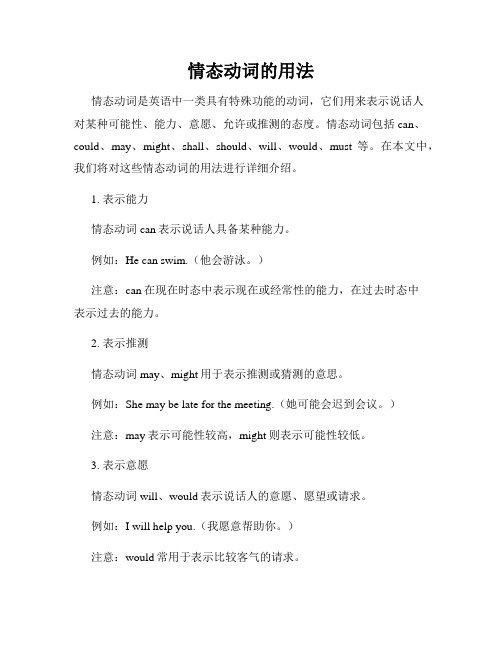
情态动词的用法情态动词是英语中一类具有特殊功能的动词,它们用来表示说话人对某种可能性、能力、意愿、允许或推测的态度。
情态动词包括can、could、may、might、shall、should、will、would、must等。
在本文中,我们将对这些情态动词的用法进行详细介绍。
1. 表示能力情态动词can表示说话人具备某种能力。
例如:He can swim.(他会游泳。
)注意:can在现在时态中表示现在或经常性的能力,在过去时态中表示过去的能力。
2. 表示推测情态动词may、might用于表示推测或猜测的意思。
例如:She may be late for the meeting.(她可能会迟到会议。
)注意:may表示可能性较高,might则表示可能性较低。
3. 表示意愿情态动词will、would表示说话人的意愿、愿望或请求。
例如:I will help you.(我愿意帮助你。
)注意:would常用于表示比较客气的请求。
4. 表示推测的过去情态动词must常用于表示对过去情况的推测或肯定。
例如:He must have missed the bus.(他肯定错过了公交车。
)注意:must用于表示对过去情况的肯定,而might用于表示对过去情况的推测。
5. 表示义务或必要性情态动词must表示对义务、必要性或确定性的肯定。
例如:You must finish your homework.(你必须完成作业。
)6. 表示建议或应该情态动词should表示建议或应该。
例如:You should go to bed early.(你应该早点睡觉。
)注意:should还可以表示对过去情况的推测,例如:He should have arrived by now.(他现在应该已经到达了。
)7. 表示允许或许可情态动词can与may可以用于表示许可或允许。
例如:Can I borrow your pen?(我可以借你的钢笔吗?)8. 表示可能性情态动词could用于表示可能性。


情态动词的用法总结及例句解析情态动词是英语中常用的一类动词,用来表示说话人的态度、情绪、推测、能力等。
它在句子中通常与动词原形搭配使用,起到强调、修饰或者推测的作用。
本文将对情态动词的用法进行总结,并通过例句解析来帮助读者更好地理解。
一、情态动词的基本用法情态动词通常没有人称和数的变化,也没有时态的变化,后面接动词原形。
有以下几种情态动词:can,could,may,might,shall,should,will,would,must,ought to等。
1. 表示能力或可能性- I can swim.(我会游泳。
)- He may come to the party.(他可能会来参加派对。
)2. 表示允许或禁止- You may go now.(你现在可以走了。
)- You must not smoke here.(你不能在这里抽烟。
)3. 表示建议或命令- You should take a break.(你应该休息一下。
)- You ought to apologize to him.(你应该向他道歉。
)4. 表示推测或猜测- He could be there.(他可能在那里。
)- It might rain tomorrow.(明天可能会下雨。
)5. 表示义务或必须- We must finish the project on time.(我们必须按时完成这个项目。
)- You ought to help him.(你应该帮助他。
)二、情态动词的细分用法除了以上的基本用法外,情态动词还有一些特殊的用法,需要注意其具体含义和用法。
1. can 和 could- 表示能力和技能:I can play the piano.(我会弹钢琴。
)- 表示请求或许可:Can I use your computer?(我可以用你的电脑吗?)- could 还可以用来表示过去的能力或许可:When I was young, I could run very fast.(小时候,我跑得很快。

高中英语知识点归纳情态动词的用法与推测技巧高中英语知识点归纳:情态动词的用法与推测技巧在英语学习中,情态动词是一个重要的语法知识点。
情态动词包括can, could, may, might, shall, should, will, would, must, need, ought to等。
它们在句子中具有特殊的功能和用法。
本文将为大家介绍情态动词的用法和推测技巧。
一、情态动词的用法1. 表示能力和可能性Can和could常用于表示能力和可能性。
例如:- I can swim.(我会游泳。
)- He could run very fast when he was young.(他年轻时可以跑得很快。
)- It can be difficult to learn a new language.(学习一门新语言可能很困难。
)2. 表示请求、许可和建议情态动词can, could, may, might和will常常用于表示请求、许可和建议。
例如:- Can you help me with my homework?(你能帮我做作业吗?)- Could I borrow your pen?(我能借用你的钢笔吗?)- May I ask a question?(我可以提问吗?)- You should go to bed early.(你应该早点睡觉。
)3. 表示推测和可能性情态动词may, might, could和must用于表示推测和可能性。
例如:- He may be at home.(他可能在家。
)- She might pass the exam.(她也许会通过考试。
)- It could rain tomorrow.(明天有可能下雨。
)- He must be tired after running for so long.(他跑了这么久肯定累了。
)4. 表示义务和建议情态动词must和should常常用于表示义务和建议。

英语情态动词的常用用法归纳1概念在英语的动词当中,凡是用来刻画人的情感动作的动词,我们称之为情态动词,情态动词有着具体的汉语意思。
但却不能独立作谓语和后面的行为动词一起构成和成谓语。
区别于其他的行为动词,情态动词没有人称和数的变化,有少数的时态现象——一般时、过去时、将来时等。
2应用一.Can1、can表示说话人的能力,常译作能、能够、会。
eg:I can speak English very well.Can you swim across the river? Yes, I can/ No, I can’t.2、can可以用来表示说话人的客观可能性,通常应用于否定疑问句式中。
eg:People can’t live without water.Can you finish the jobs in three hours?Can this be true.3、在口语里,can表示允诺、允许、可以。
等于may,但是may的语气重于can。
eg:Can I come in? = May I come in?Can I use your bike? = May I use your bike ?*表示允许可以may mightcould can4、在“过去时”的语境里,通常用could 表示它的过去式,用be able to 短语(was/were)而could通常用来在一般现在时的语境里表示委婉语气eg:Could(can)you show me the way to the supermarket?5、can表示猜测(1)对现在状态的一种猜测,只能用在否定疑问句中。
eg:Zhang can’t be ill really?This can’t be done by him.(2)对现在动作的猜测eg: The boy can’t be telling lies.Mary works so hard, now, she can’t be sleeping.(3)对过去动作的一种猜测eg:He can’t have gone to the bookshop yesterday.Mother couldn’t have said it.6、can(could)惯用法(1)can’t wait to do 迫不及待做…….eg: Children can’t wait to eat apples in the basket.(2)can’t help doing 情不自禁做某事。
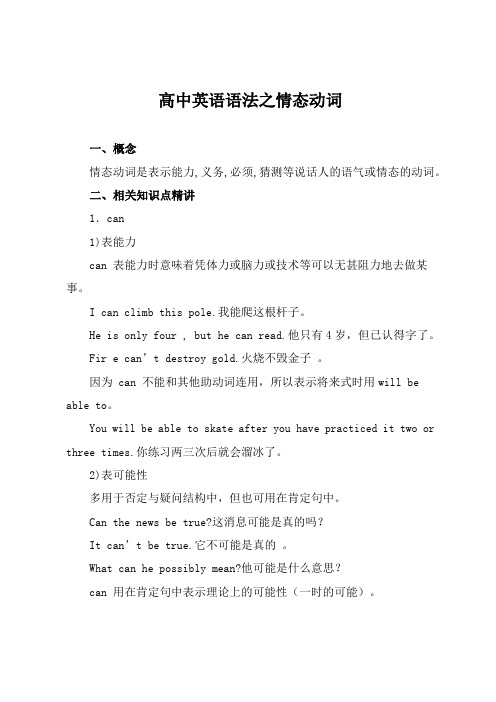
高中英语语法之情态动词一、概念情态动词是表示能力,义务,必须,猜测等说话人的语气或情态的动词。
二、相关知识点精讲1.can1)表能力can 表能力时意味着凭体力或脑力或技术等可以无甚阻力地去做某事。
I can climb this pole.我能爬这根杆子。
He is only four , but he can read.他只有4岁,但已认得字了。
Fir e can’t destroy gold.火烧不毁金子。
因为 can 不能和其他助动词连用,所以表示将来式时用will be able to。
You will be able to skate after you have practiced it two or three times.你练习两三次后就会溜冰了。
2)表可能性多用于否定与疑问结构中,但也可用在肯定句中。
Can the news be true?这消息可能是真的吗?It can’t be true.它不可能是真的。
What can he possibly mean?他可能是什么意思?can 用在肯定句中表示理论上的可能性(一时的可能)。
Attending the ball can be very exciting.The road can be blocked.这条路可能会不通的。
may 在肯定句中表示现实的可能性。
The road may be blocked.这条路可能不通了。
3)表示允许(和 may 意思相近)常见于口语。
Can (May) I come in ?我能进来吗?Can I smoke here ?我可以在这里抽烟吗?2.could 的用法1)表过去的可能和许可,(多用于间接引语中)At that time we thought the story could not be true.那时我们认为所说的事不可能是真的。
Father said I could swim in the river.爸爸说我可以在河里游泳。

高中英语知识点归纳情态动词和实义动词的用法讲解一、情态动词的定义和用法情态动词是一类特殊的助动词,用来表示说话人对某种行为或状态的态度、情感或推测等。
情态动词常用于与实义动词连用,构成谓语。
下面对几个常见的情态动词进行归纳和用法讲解。
1. can/could:a) 表示能力、可能性或许可:She can swim.(她会游泳)b) 表示请求或邀请:Can you lend me your pen?(你能借给我你的笔吗?)c) 表示推测:He could be at home now.(他现在可能在家)2. may/might:a) 表示可能性:It may rain tomorrow.(明天可能会下雨)b) 表示请求或许可:May I use your phone?(我可以用一下你的电话吗?)c) 表示祝愿:May you have a happy birthday.(祝你生日快乐)3. must:a) 表示必须或肯定:You must finish your homework.(你必须完成作业)b) 用于反问句,表示强烈的建议或命令:Must I go now?(我现在必须离开吗?)4. shall/should:a) shall用于第一人称,表示将来的意愿、承诺、建议或命令:I shall help you with the housework.(我会帮你打扫房间)b) should用于其他人称,表示应该、建议或推测:You should exercise regularly.(你应该经常锻炼)5. will/would:a) 表示将来的意愿、决心或承诺:I will visit my grandparents this weekend.(这个周末我将去看望我的祖父母)b) would用于过去的愿望、习惯或客气的请求:He would always help others when he was young.(他年轻时总是帮助别人)二、实义动词的定义和用法实义动词是指表示实际动作或状态的动词。
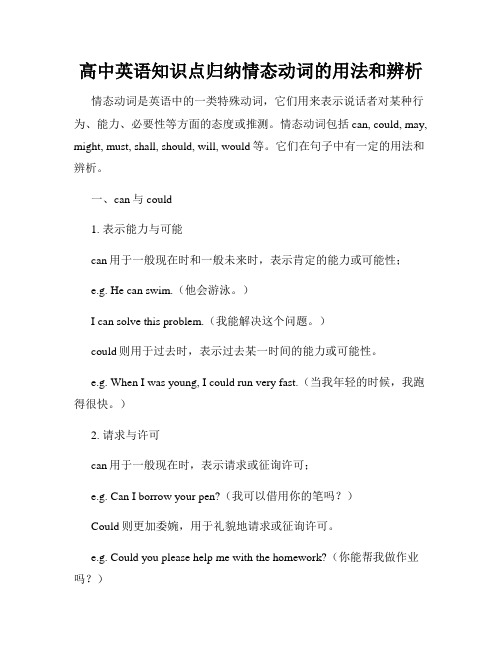
高中英语知识点归纳情态动词的用法和辨析情态动词是英语中的一类特殊动词,它们用来表示说话者对某种行为、能力、必要性等方面的态度或推测。
情态动词包括can, could, may, might, must, shall, should, will, would等。
它们在句子中有一定的用法和辨析。
一、can与could1. 表示能力与可能can用于一般现在时和一般未来时,表示肯定的能力或可能性;e.g. He can swim.(他会游泳。
)I can solve this problem.(我能解决这个问题。
)could则用于过去时,表示过去某一时间的能力或可能性。
e.g. When I was young, I could run very fast.(当我年轻的时候,我跑得很快。
)2. 请求与许可can用于一般现在时,表示请求或征询许可;e.g. Can I borrow your pen?(我可以借用你的笔吗?)Could则更加委婉,用于礼貌地请求或征询许可。
e.g. Could you please help me with the homework?(你能帮我做作业吗?)二、may与mightmay用于一般现在时和一般未来时,表示较正式的许可或征求对方意见。
e.g. May I use your phone?(我可以用你的电话吗?)might则表示过去或将来的一种可能性,常用于虚拟语气中。
e.g. If it rains tomorrow, we might stay at home.(如果明天下雨,我们可能会呆在家里。
)三、must1. 表示推测或推理must用于一般现在时和一般过去时,表示根据已有的客观事实或推理得出的合理推测。
e.g. He has been studying hard, so he must pass the exam.(他一直在努力学习,所以他一定会通过考试。
)2. 表示义务或必要性must用于一般现在时和一般过去时,表示说话者的主观认识或认为事物具有必然性或必要性。


高中英语知识点归纳情态动词与情态副词的特殊用法情态动词和情态副词在英语语法中扮演着重要的角色。
它们不仅能够表达说话者的态度和情感,还能够传达一些特殊的意义和信息。
在高中英语学习中,学生们需要对情态动词和情态副词的特殊用法有所了解。
本文将对高中英语中常见的情态动词和情态副词特殊用法进行归纳总结。
一、情态动词的特殊用法1. 表示推测和可能性情态动词can、could、may、might、must、should等可以用于表示对某种情况的推测和可能性。
例如:- He can be at home.(他可能在家。
)- It must be raining outside.(外面一定在下雨。
)2. 表示许可和请求表示许可的情态动词有can、could、may,表示请求的情态动词有can、could、may、would。
例如:- Can I go to the restroom?(我可以去洗手间吗?)- Could you please help me with my homework?(你能帮我做作业吗?)3. 表示能力和能够情态动词can和could可以表示能力和能够的意思。
例如:- She can speak three languages.(她能说三种语言。
)- Could you play the piano when you were a child?(小时候你会弹钢琴吗?)4. 表示义务和必要性情态动词must和should可以表示义务和必要性。
例如:- You must finish your homework before going out.(出去之前你必须完成作业。
)- She should apologize for what she said.(她应该为她说的话道歉。
)二、情态副词的特殊用法1. 表示程度和强调情态副词really、very、extremely等可以用于表示程度和强调。
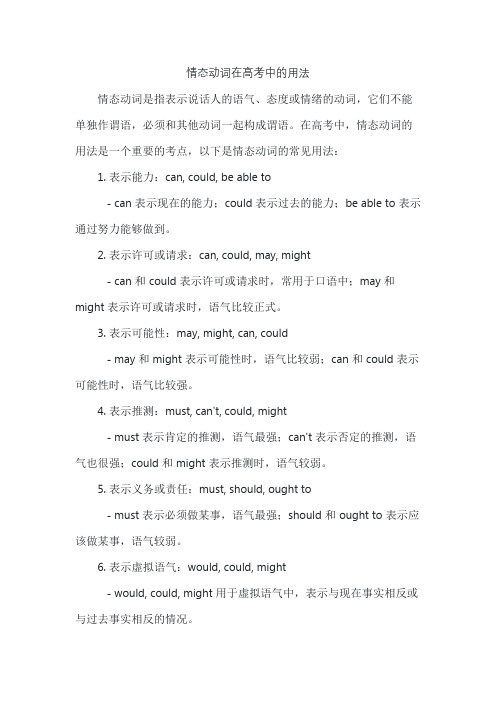
情态动词在高考中的用法
情态动词是指表示说话人的语气、态度或情绪的动词,它们不能单独作谓语,必须和其他动词一起构成谓语。
在高考中,情态动词的用法是一个重要的考点,以下是情态动词的常见用法:
1. 表示能力:can, could, be able to
- can 表示现在的能力;could 表示过去的能力;be able to 表示通过努力能够做到。
2. 表示许可或请求:can, could, may, might
- can 和 could 表示许可或请求时,常用于口语中;may 和might 表示许可或请求时,语气比较正式。
3. 表示可能性:may, might, can, could
- may 和 might 表示可能性时,语气比较弱;can 和 could 表示可能性时,语气比较强。
4. 表示推测:must, can't, could, might
- must 表示肯定的推测,语气最强;can't 表示否定的推测,语气也很强;could 和 might 表示推测时,语气较弱。
5. 表示义务或责任:must, should, ought to
- must 表示必须做某事,语气最强;should 和 ought to 表示应该做某事,语气较弱。
6. 表示虚拟语气:would, could, might
- would, could, might 用于虚拟语气中,表示与现在事实相反或与过去事实相反的情况。
在高考中,情态动词的用法需要根据具体的语境来判断,因此需要考生具备较强的语言理解能力和运用能力。
同时,考生还需要注意情态动词的时态和语态等方面的变化,以确保答案的准确性。
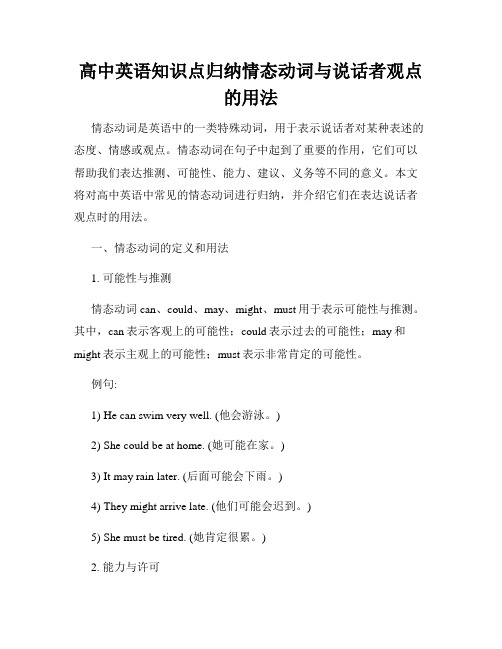
高中英语知识点归纳情态动词与说话者观点的用法情态动词是英语中的一类特殊动词,用于表示说话者对某种表述的态度、情感或观点。
情态动词在句子中起到了重要的作用,它们可以帮助我们表达推测、可能性、能力、建议、义务等不同的意义。
本文将对高中英语中常见的情态动词进行归纳,并介绍它们在表达说话者观点时的用法。
一、情态动词的定义和用法1. 可能性与推测情态动词can、could、may、might、must用于表示可能性与推测。
其中,can表示客观上的可能性;could表示过去的可能性;may和might表示主观上的可能性;must表示非常肯定的可能性。
例句:1) He can swim very well. (他会游泳。
)2) She could be at home. (她可能在家。
)3) It may rain later. (后面可能会下雨。
)4) They might arrive late. (他们可能会迟到。
)5) She must be tired. (她肯定很累。
)2. 能力与许可情态动词can、could和be able to用于表示能力与许可。
其中,can 表示一般的能力或许可;could表示过去的能力或许可;be able to表示具体的能力或许可。
例句:1) I can speak English. (我会说英语。
)2) She could walk when she was one year old. (她一岁的时候就会走路了。
)3) Are you able to finish the task? (你能完成这个任务吗?)3. 必要性与建议情态动词must、have to和should用于表示必要性与建议。
其中,must表示肯定的必要性;have to表示客观上的必要性;should表示建议或期望。
例句:1) You must study hard for the exam. (你必须努力学习备考。

情态动词用法归纳情态动词的特征:1、情态动词本身具有一定的词义,不能单独作谓语,后面只能接动词原形。
2、没有人称和数的变化。
一、can和could1、表示能力,常译为“能、会”。
IcanspeakEnglish.2、表示许可,常译为“可以”--CanIuseyourphone?--Ofcourseyoucan.3、表示对现在或过去情况的推测,只用于疑问句或否定句。
--Canshebeintheclassroom?她可能在教室吗?—No,shecan'tbeinit.不,她不可能在教室。
Itcan'thaverainedlastnight,forthegroundisdry.4、用于肯定陈述句中,表示理论上或习惯上的可能性,也可以表示某人或某物一时的情况,译为“有可能,有时会”。
Accidentscanhappenatanytime.事故随时会发生。
Itcanbeverywarminthisarea.这个地区有时可能非常暖和.Hecanbeveryfriendlyattimes.他有时会非常友好。
5、用于否定句、疑问句中,表示惊讶、不相信、反问等。
Howcanyousaythat?你怎么能那样说?6、can与beableto(1)can只有现在时和过去时,而beableto有更多的时态变化。
在将来时、完成时和非谓语动词结构中只能用beableto;Willyoubeabletocome?你能来吗?I'msorryIhaven'tbeenabletoansweryourletterintime.真对不起,我没有及时地给你回信。
(2)can一般指自身具有的能力,而beableto表示经过一段时间努力后所具有的能力,相当于succeedindoing或managetodosth。
ThistimeIfailedintheexam,butI'llbeabletopasstheexamnexttime.(3)在否定句结构中,beableto指暂时的情况,而can可以指经常的情况。
高中英语情态动词用法归纳与练习A: can / could = be able to1 表示能力两种时态can (could),其他时态要用be able to的形式He can speak French.Was/were able to 可以表示成功做成某事的含义* managed to do / succeede d in doingWith our help, he was able to build the house.2 表示请求或许可Could 比Can 更加客气* mayCan I go now Yes, you can.3 表示推测或可能性,常用于否定句和疑问句Can he be at school?Today is Sunday. He can't be at school.Can’t couldn’t/ Can Could have doneThere is no light in the room. Can she have gone to bed?She can’t have gone to school----- it’s Sunday.Could have done 可用在肯定句中表示过去存在的可能性* may have done She could have gone out with some friends yesterday.Could have done 可以表示虚拟语气某事可能发生(并没有发生)It was silly to throw the TV out of the window. It could have hit somebody. 批评某人没有完成某事(本可以做某事)You are late again. You could have got up earlier.4 can 表示客观上的可能性*Anybody can make mistakes.B: may and might1 表示请求和允许类似用法can could(更加口语化)May I watch TV now Yes, you may.2 表示可能性; 猜测might比may更加不确定may/might have done 对过去的揣测*He may be busy these days.May not 可能不;不可能;一定不可3 表示祝愿Wish you success!May you succeed!*C: must and have to1 表示必须;一定要可以用have to 代替must 现在;将来的必须而且是主观看法*have to 有多种时态而且强调客观情况I really must stop smoking now.I had to leave early because I wasn’t feeling well.Must I come here?Yes, you mus t. No, you needn’t. needn’t / don’t have to must not 一定不能做某事mustn’t2 must 表示推测意思非常肯定“一定是”“一定会”It must be raining outside.Must have done 对过去/完成的推测* must have done, didn’t / hasn’tMust be doing 推测现在正在进行He must have gone over the article, hasn’t he?It must have rained last night, didn’t itD: need and dare 过去时dared情态动词和实意动词的区别A 人称变化B do / to doC 直接否定/ 间接否定can workNeed /dare 肯定句中,实义动词She needs to do it. I dare to do it.使用在否定句,疑问句中,情态动词,实义动词。
I dare not do it. I don’t dare (to) do i t.I need not do it. I don’t need to do it.1 need 情态动词无时态;人称的变化多用于疑问句和否定句You needn’t try to explain.Needn’t = don’t have toNeedn’t have done sth 过去本不必做某事* 虚拟语气2 need 实义动词有时态;人称的变化后接to do You need to tell us the t ruth.The car needs repairing. The car needs to be repaired.3 dare 情态动词过去时dared 无人称的变化多用在疑问句和否定句Dare he tell them what he knows?4 dare 实义动词有时态;人称的变化后接to do用于疑问句和否定句时其后的to 有时可省略Do you dare (to) jump off the high wallE: will and would1 表示征求对方(第二人称)意见或询问对方意愿would 比will 更客气委婉Will you have some more wine?Would you mind my smoking here?2 will 表示习惯性动作或某种倾向would 表示过去习惯性动作或某种倾向Fish will die out of water.When I was young, I would play badminton on Sundays.Would 与used to 的区别*Would 只能用来表示重复的动作而不能表示状态Used to 既可表示动作也可表示状态, 强调现在不如此He used to be a university student.3 will 表示意愿决心I will never do that again.F: shall, should and ought to1 shall 在问句中表示征求对方意见或请求用于第一,三人称What shall we do now?2 shall 肯定句中表示说话人强烈的感情允许,命令,禁止和威胁*或表示按规定,规章和义务等用于第二,三人称If you dare to do that, you shall be punished.These rules shall be obeyed.Shall not 禁止,不许3 shall 决心,意愿= willI shall come if I want to.4 should 表示劝告,建议= ought to 应该You should wash your hands first.Should 主要表示主观看法*Ought to 客观情况法律、规定、义务的使用Should have done / ought to have done sth 虚拟语气*Shouldn’t have done / ought not to have done sthYou should have done it today.5 should 推测推论可能性= ought to *估计They should/ ought to be there by now.6 should说话人的感情。
如惊奇、愤怒、失望等、“竟然”否定句疑问句You can’t imagine that well-behaved gentleman should be so rude to a lady Why should he do such a thing推测肯定性可能性由强到弱must / shall* / ought to / should / would* / could* / may / might /can 理论上的可能/ can Could / can’t couldn’tmust 用于表示"必定","必会":All mankind must die.(表示必然会发生的事)所有的人一定会死的。
shall用于表示"必定":I shall be rich one day. (shall be )总有一天我发达的。
ought to / should用于表示"想必会"(语气较must 弱):They should / ought to be there by now.他们想必已到那儿了。
will 和would 用于表示"预测"或"习惯性":I think he will be all right now. (will be 表示一定会)我想他现在一定好了。
Could 表推测No, but the shop could be in the east of the city.may 和might 用于表示"事实上的可能性"或"预测":It may snow later this afternoon. (表示预测)今天下午可能会下雪。
You might be right. (表示有可能)你可能是对的。
Can理论上的可能Anybody can make mistakes. (只表示理论上的可能性)任何人都可能犯错误。
Can Could / can’t couldn’t 疑问否定He can't be at home. (否定句)他不可能在家。
Can the news be true (将情态动词can 置于主语the news 前就成疑问句) 这消息可能是真的吗?情态动词be doing情态动词have donemust / could / may / might / Can; could have done / can’t ; couldn’t have done请求和允许Can could I; he /may might I; he / will would you / shall should ought to I; he / Must I?不同类型语气分析Can I go with you (请求)我能跟你一起走吗?Could I ask you something (请求,用could 比can 更婉转)我可以问你一件事吗?May I make a suggestion ?我可以提个建议吗?Might I take a look of your work ?我看看您的大作行吗?Will you kindly tell me the way to the post office (表示客气请求)请问到邮局怎么走?Would you give me your address (用would 比will 表示更客气)请你告诉我你的地址,好吗?Shall we talk?我们谈谈好吗?What should we do next (用should 比shall 表示更客气)下一步我们该怎么做?Shall he come to see you (用于第三人称疑问句)要不要他来看你?Must I finish the work right now?Must I pay now (用于疑问句) (如回答不必时,需用needn't 或don't have to)我现在就得付款吗…情态动词的用法:表示“应该”、“必须”命令和建议(Must, have to , Shall, ought to, Should, May*, Might*,)Must 用于表示“必须”、“务必”:You must keep the place clean. (务必)你务必保持地方干净。